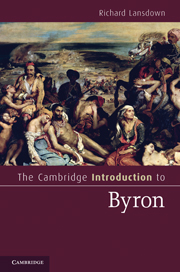Book contents
- Frontmatter
- Contents
- Figure and tables
- Preface
- Abbreviations
- Map: Lord Byron’s Europe
- Chapter 1 Life
- Chapter 2 Context
- Chapter 3 The letters and journals
- Chapter 4 The poet as pilgrim
- Chapter 5 The orient and the outcast
- Chapter 6 Four philosophical tales
- Chapter 7 Histories and mysteries
- Chapter 8 Don Juan
- Chapter 9 Afterword
- Notes
- Further reading
- Index
Chapter 6 - Four philosophical tales
Published online by Cambridge University Press: 05 February 2013
- Frontmatter
- Contents
- Figure and tables
- Preface
- Abbreviations
- Map: Lord Byron’s Europe
- Chapter 1 Life
- Chapter 2 Context
- Chapter 3 The letters and journals
- Chapter 4 The poet as pilgrim
- Chapter 5 The orient and the outcast
- Chapter 6 Four philosophical tales
- Chapter 7 Histories and mysteries
- Chapter 8 Don Juan
- Chapter 9 Afterword
- Notes
- Further reading
- Index
Summary
‘Byron’, it has been said, ‘is the poet of liberty’ – which is like saying Wordsworth is the poet of nature; in each case there is a complicated relationship between the writer and his theme. We saw that the Byronic hero purchased freedom at the cost of cutting himself off from the world by rejecting its moral claims on him. (His avatar, Mr Rochester, in Charlotte Brontë’s Jane Eyre (1847), does much the same thing as regards his plans for a bigamous marriage with the novel’s heroine.) ‘But Byron’s concept of the free hero … is not monolithic’, the critic Drummond Bone suggests, and freedom in his poetry ‘is not simply a matter of a central character’s struggle … but of explicit and implicit examination of historical and other fictional examples of its existence, or more often its failure to exist.’
Four of Byron’s medium-length verse narratives – The Prisoner of Chillon (1816), Beppo, Mazeppa (both 1817–18), and The Island (1823) – treat the issue of liberty with close attention. Each is a masterpiece of a different kind, and as a group they also differ from the earlier Eastern Tales. The origins of that set of poems are highly specific, in terms of both Byron’s state of mind at the time of their composition and their setting within the ‘Aegean matrix’ where Islam and Christianity meet. The later group is more diverse. The Prisoner of Chillon concerns a sixteenth-century Swiss Protestant martyr; Beppo is an entirely fictitious Venetian shaggy dog story; Mazeppa relates an incident in the early life of a 70-year-old ally of King Charles XII of Sweden, on retreat in the Ukraine in 1709; and The Island, set in Polynesia, is based on the Bounty mutiny of 1789. Three are historical, therefore, but only in the loosest sense; and whereas every work of literature is to some extent personal to its author, these stories contain little of the confessional element tangible in Manfred or The Bride of Abydos.
- Type
- Chapter
- Information
- The Cambridge Introduction to Byron , pp. 97 - 111Publisher: Cambridge University PressPrint publication year: 2012



